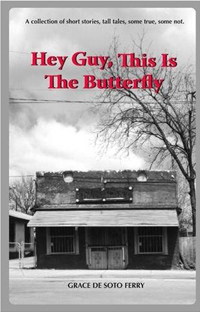Book Review: Hey Guy, This Is The Butterfly
Santa Barbara Author Grace De Soto Ferry's Collection of Short Stories Makes Memories Soar
Named for the bar across the street from S.B. author Grace De Soto Ferry’s childhood home in San Antonio, Hey Guy, This Is The Butterfly presents a compact and readable 24 short stories in 139 pages. The author grew up in the Mexican neighborhood of a segregated community, which she left in 1962. After returning there 50 years later, she found the home her father built, along with all of her childhood remembrances, gone, including the bar. The result of her reflections is “a collection of short stories, tall tales, some true, some not.”

Short is the operative word here, as the narratives are all within one to 11 pages long, with many on the shorter side and a handful at just a paragraph. Like a batch of collected memories, they’ve been jotted down sparsely to share, to keep although that reality is now gone, and isn’t that what many great American short stories do well — say a lot with very little, say more with what’s not being said?
De Soto Ferry starts from the point of view of a girl reminiscing about living in a house across the street from The Butterfly bar, presumably the character most closely resembling the author herself, and from there takes off on a tour of this time and place, told from a variety of perspectives, some male, some female, some old, some young, but all Mexican American and all poor. These are characters living with the sad facts of prejudice, being unhappy with something about themselves, oppressive heat as well as oppressive poverty … but there’s humor, a positive tone, and clear nostalgia for De Soto Ferry’s girlhood days, even a sadness that the neighborhood is now so changed by “what some call progress” (development and commercialization).
The various characters share something in common: They long for something lost to the past, something they can’t ever again go home to (in more than one case the actual physical structure of a beautiful old dwelling). They carry with them “a sense of loss for a time in my life that was gone” (“The Ladies”). We meet an overweight little girl passing for white so she can swim in the public pool on a hot day; a young man who forms an unexpected connection with a white lady in perpetual mourning; two women remembering old lovers while they harvest raisins; an unwed mother forced to give up her baby; an aging Elvis impersonator; and many others.
Through these tales and imaginings, De Soto Ferry proves that when we write memories down, when we put ourselves in another’s shoes, and when we share what we’re thinking and feeling at different stages of life, it becomes clear that we all sometimes feel alone, we all cling to things now long gone, and we are all far more similar than we are different. “Regardless of who we are or where we come from, we’re all in the same boat” of our common humanity (“Someone Should Change the Sign”). Maybe in a sense, the memories we cling to, even the dark ones, once wrapped up in a cocoon of carefully chosen words, can emerge to become something beautiful, something more like freedom.



